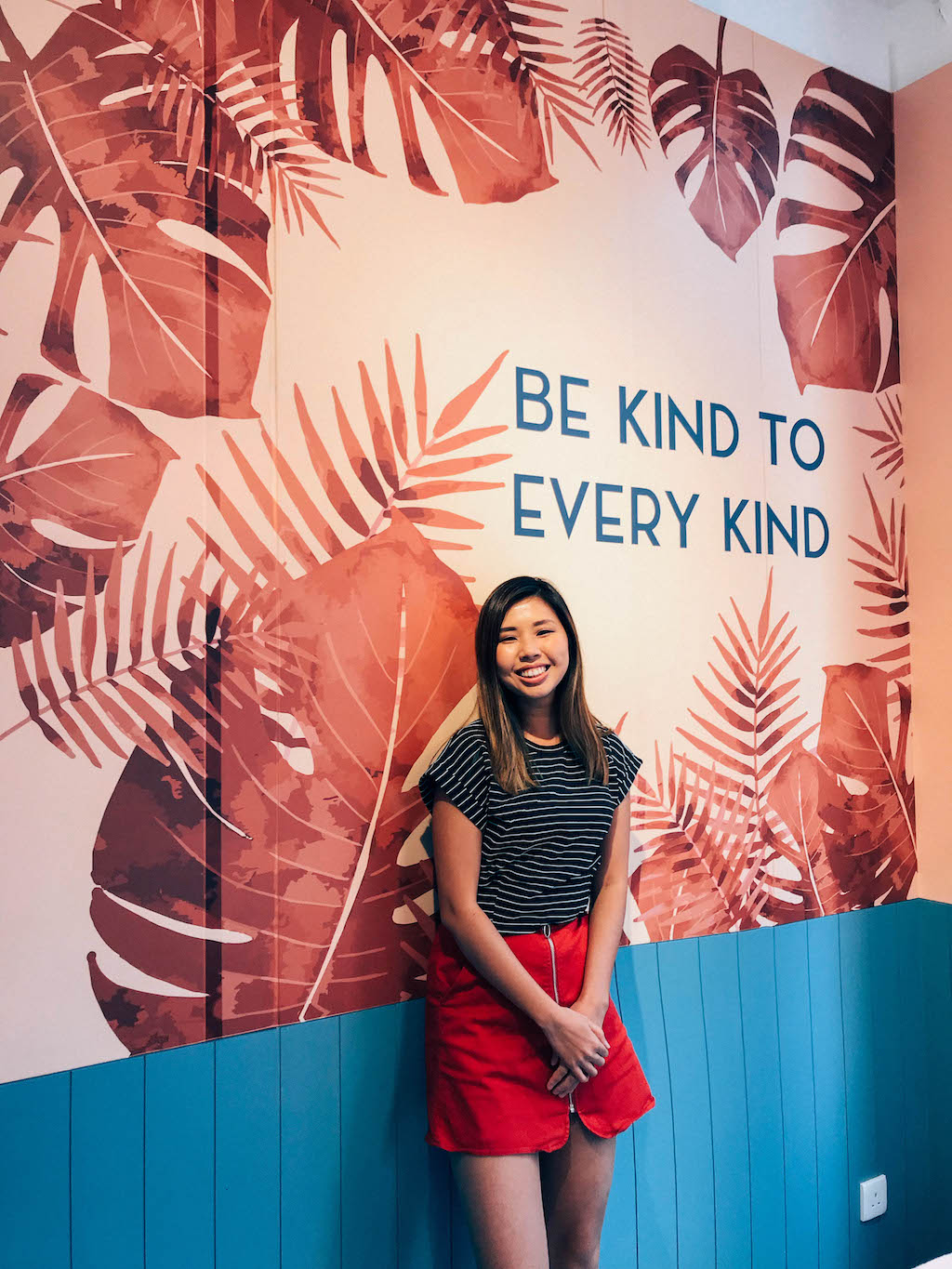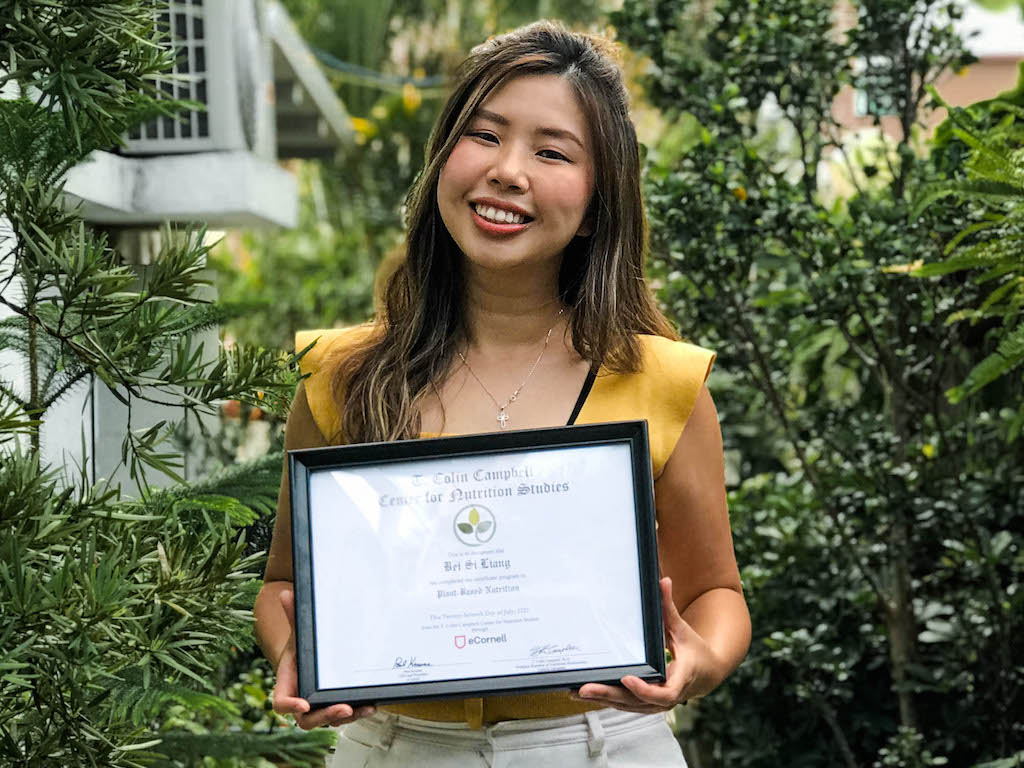Real Life Vegan: My Loved Ones Kept Asking Me If My Vegan Diet Was Healthy, So I Got Certified In Plant-Based Nutrition
4 Mins Read
Welcome to our new series, in which we offer real life Asian vegans a platform to tell their plant-based story in their words. In our first edition, UX Designer Beth Liang shares how she pursued a plant-based nutrition certification after getting tired of constantly debating with friends and loved ones about the benefits of a vegan diet.
I was drawn to veganism about four years ago, after watching behind the scenes footage of animal slaughter processes. I learned that by cutting animal foods out of my diet, I could help the environment, save animal lives and improve my health. Throughout the past few years, I have actively educated myself on topics surrounding nutrition and sustainability. It was unsettling to learn about the disturbing practices of the food industry and how information is often miscommunicated by brands to mislead consumers in order to make a profit. The more I read and researched, the more my commitment towards veganism grew. The only problem was: other people didn’t seem to agree with my lifestyle choice.
I often felt stuck when skeptics challenged me, particularly when it came to my nutrition knowledge. My friends and loved ones kept expressing their concerns about my health, especially around whether I was getting enough protein and iron, and from the ‘right’ sources. This left me feeling frustrated, and eventually, I felt like I needed to look into some kind of formal training on nutrition to ensure I had my facts right and could take on these recurring plant-based nutrition debates. I began to research what the best online plant-based programs were and that’s when I discovered Plant-Based Nutrition Certificate program offered by eCornell in partnership with Cornell University.
A few weeks ago, I completed the course, which is offered entirely virtually and is authored by doctors T. Colin Campbell and Thomas Campbell, both renowned names in the plant-based world, best known for their project and best-selling book The China Study: The Most Comprehensive Study Ever Conducted On Nutrition. The course is six weeks long and contains three modules, and it features well-known plant-based doctors such as Dr. Michael Gregor, Dr. Caldwell Esselstyn, and Dr. Neal Barnard. The workload is fairly light- about five hours per week, although you might find yourself spending way more time re-reading the materials over and over because of how compelling the studies shared are.

I found the course to be uniformly excellent, chiefly because the information presented is non-conflicting and science-based. My key takeaways from the course are the amazing benefits and hidden powers of a whole-food plant-based (WFPB) diet. The course often compares the WFPB diet to the Standard American Diet (known by its acronym as the S.A.D. diet), which describes the typical Western diet that’s high in fat, sugar, and processed foods.
The doctors presented cases involving patients suffering from years of chronic illnesses often heavily dosed on medication. When the patients decided to try the WFPB diet intervention, the results were hard to ignore. The evidence-based research proves time over time again how a WFPB diet can improve and even reverse health conditions. As many of the experts state: Let food be thy medicine and naturally heal us! Some of you make remember this war cry from the documentary Forks Over Knives, the 2011 documentary by Lee Fulkerson that brought The China Study to mainstream attention.
The Plant-Based Nutrition Certificate course also covers a lot about politics, lobbying and how to tell if a study is funded by a for-profit party with an agenda. Indeed, health and nutrition are both complicated topics, far more complicated than most of us realize. During the course, the major questions that I had about nutrition were mostly answered, such as are gluten-free foods healthy and what about plant-based diets for athletic performance. By the end of the course, I felt far more equipped to comment on commonly asked nutrition questions, such as dietary protein requirements. Did you know an average woman only needs 40g of protein per day, and an average plant-based diet provides far more than this anyway?
I was disheartened to learn that by the end of the course, I had undergone more nutrition training than the majority of doctors receive during medical school. In fact, most graduating medical students feel that their nutrition education is inadequate.
While studying, I shared the jaw-dropping research studies with my fiancé, himself a massive veganism skeptic. He received concerning results about his blood sugar levels from his most recent body checkup but was not sure what to do to improve his condition. Thanks to the course, I learned a lot about how a plant-based diet can quickly address these issues! I managed to get him to eat 80% vegan by the end of the course by sharing powerful studies and the facts that I had learned. We were equipped with knowledge of foods to include and avoid in our diets and begin to cook plant-based meals at home. This was a huge change for me, as I previously found it hard to convince him based on my lifestyle preferences alone.
We can empower ourselves to take control of our health by learning the basics of nutrition. Unfortunately, reliable nutrition information is hard to come by, and health topics can be difficult to navigate. This course left me wanting more, and it inspired me to continue my nutrition education and hopefully become a registered dietitian one day.
Sign up for the e-Cornell Plant-Based Nutrition Certificate course here, or watch sample videos from the featured instructors here.
Know a vegan who wants to tell their story or want to share yours? Get in touch.
Lead image courtesy of Beth Liang.



